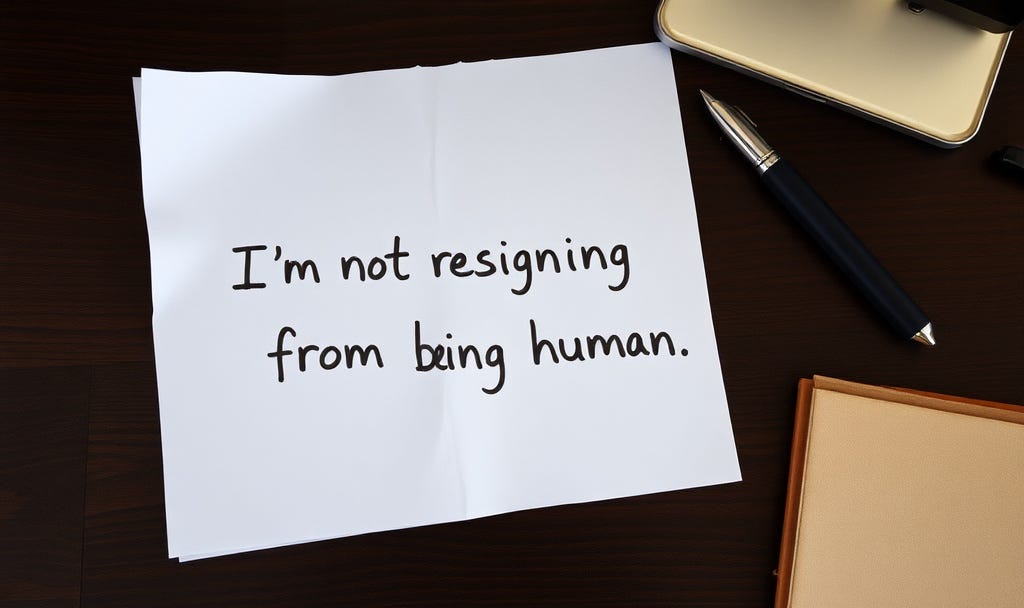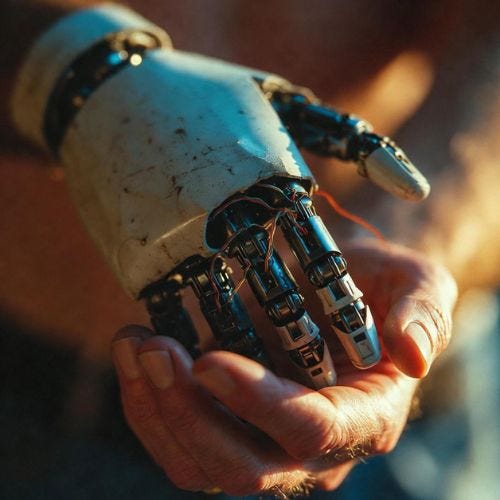I Asked AI to Write My Resignation Letter From Being Human
And then I realized I could never sign it
I did something stupid the other night.
I opened Perplexity and typed:
“Write my resignation letter from being human.”
Six seconds later, I’m holding a masterpiece of corporate politeness that basically says, “Thanks for the memories, meat sack. I’m upgrading to pure efficiency. Don’t forget to water the houseplants.”
It even wished my future algorithmic self “every success in scalable endeavors.”
I stared at it so long my watch thought I was dead.
The letter was perfect. Flawless structure. Zero typos. Tone calibrated exactly between gracious and triumphant. It could have been written by a McKinsey partner who moonlights as a Hallmark poet.
And that’s when the panic hit—not because the machines are coming, but because the letter was missing something I couldn’t name at first.
It had no tremor in it.
No second thoughts. No lump in the throat. No half-remembered smell of your mother’s kitchen on the day you left for college. No fear that maybe, just maybe, you’re making the biggest mistake of your life.
It was resignation without regret. Departure without grief. Evolution without the ache of leaving something beloved behind.
That’s when I understood: the things that make us irreplaceable aren’t the parts we’re proud of. They’re the parts we’re almost embarrassed by. The inefficiencies. The bleed.
Let me tell you about three of them.
1. Creative Desperation (the kind that only shows up after you’ve been broken open)
Real ideas rarely arrive when you’re optimized. They arrive when you’ve been stupid in love, or bankrupt, or standing in the rain at a funeral, wondering why the universe bothered giving you a heart if it was just going to break it this hard.
In 2013 to 2014, Airbnb was dying. Investors were writing it off. The data was brutal. People wanted cheaper hotels, not strangers’ couches.
Brian Chesky, the CEO, remembered something from childhood. His family was solidly middle-class but never rich enough for fancy vacations. The only way they ever traveled was by crashing on relatives’ couches, always feeling like an outsider in someone else’s home, sleeping under a blanket that smelled like someone else’s life.
That ache, of never quite belonging anywhere, stuck with him.
The data team begged him to double down on listings, pricing algorithms, and better photos. Wall Street wanted margins. Focus groups wanted predictability.
Instead, Chesky poured millions into a complete rebrand around a single phrase no A/B test had ever justified: Belong Anywhere.
He commissioned a weird, loopy symbol called the Bélo that looked like a paper clip having an identity crisis. Analysts called it “hippie nonsense.” Engineers rolled their eyes at the cost. Early user testing was a disaster. “What does ‘belong’ even mean?”
He shipped it anyway because he refused to let his childhood wound stay meaningless.
Today, “Belong Anywhere” is one of the most valuable brand promises in history. Millions of travelers tear up reading host reviews that say “For the first time in my life I felt like I belonged somewhere.” That emotional resonance didn’t come from interpolation of existing data. It came from one man’s private scar tissue.
No training run on earth contains that particular loneliness. That’s why it worked. Machines interpolate. Humans refuse to let the wound close without making something out of the scar.
2. Intentionality That Costs You Something
In a 2010 Counseling Today profile on working with “challenging” clients, therapist Valerie Zaffos described a 53-year-old former yachtsman named Joe.
Joe showed up depressed, powerless, and furious at the world. For the first several sessions, he filled the room with racist rants—ugly, provocative, clearly designed to push everyone away and keep the focus off his own pain.
Any AI companion would have handled it flawlessly: perfect reflective listening, non-judgmental summaries, gentle redirects.
But Zaffos saw the rants for what they were, an avoidance tactic, a shield against the deeper terror of being seen and judged as weak.
One day, she interrupted him mid-rant and said quietly,
“It must be so difficult to feel this strongly about something and then have to act the complete opposite in public.”
The room went still.
Joe deflated. For the first time, he admitted the shame and powerlessness underneath the rage. The rants stopped. Real work began. He started reclaiming the personal power he thought he’d lost forever.
That single sentence wasn’t in any protocol. It risked everything. Joe could have stormed out and never returned. She said it anyway because another human’s pain had just become more important than her comfort or her caseload.
AI can simulate care.
It cannot decide, in a split second, to be wrecked by you.
3. Emotional Depth That Turns Information Into Meaning
A few years ago, I was interviewing
about her book Bittersweet.She spoke gently about her mother’s Alzheimer’s diagnosis: a moment marked by clinical facts that seemed to strip everything bare.
Progressive memory loss. Inevitability. No cure.
A machine could recite the prognosis with flawless empathy, yet without feeling.
But Susan did something deeper.
As the disease wore away years of distance and old wounds, as the silences grew and fights faded, her mother transformed before her eyes. The woman who once snapped green beans on their Brooklyn porch returned: warm, lively, unmistakably herself.
Susan would sit beside her mother for hours, traveling those fragile conversational lanes that remained. She’d ask about Brooklyn streets, old recipes, moments of laughter: questions no medical guidebook suggested.
And even when yesterday was lost, her mother’s eyes would light up. Stories resurfaced, tender and familiar.
The harsh medical data became something else: a testament not to loss alone, but to love reclaimed and fiercely held.
A machine can give you information.
Only a human can choose to lean into the fading light, to ask once more, with all the weight of memory and heart, “Tell me about the old neighborhood,” and feel the tears rise as those memories take flight for the last time.
Information is everywhere.
Meaning is handmade, born from our shattered and mended hearts.
The Man Who Could Hear Robots Cry
Let me tell you about my cousin David from Detroit (not his real name, for obvious reasons). The guy who spent twenty-seven years tightening four bolts, only to be replaced by a robot.
The robots started failing in ways no diagnostic manual predicted. Micro-vibrations. Temperature ghosts. The kind of subtle wrongness you only notice if you’ve spent decades bored out of your skull listening to the same mechanical heartbeat.
They brought David back. He now makes more money than the plant manager.
Every morning, he walks the line with a cup of coffee, listening to machines the way a parent listens for a fever in the night. One almost-inaudible whine, one half-second hesitation, and he knows something’s hurting before the sensors do.
Twenty-seven years of soul-crushing repetition gave him something no model can be trained on: the ability to feel when a machine is lying about being fine.
So, No, I’m Not Signing the Resignation Letter
The future doesn’t belong to the people who figure out how to act more like machines.
It belongs to the people who refuse to cauterize the parts of themselves that slow them down, embarrass them, cost them, exhaust them.
The crack in your voice when you say “I love you” and feel it so deeply, it changes everything.
The reckless, foolish risks you take because your heart broke once and you decided the world couldn’t just get away with it.
The way you stay silent in someone else’s pain long after most have moved on.
These aren’t flaws. These are the parts that can’t ever be copied.
So I closed that resignation letter.
Then I opened a blank page and started writing the opposite: a love letter to being human.
It’s messy, it takes forever, I cry, delete, and start over endlessly.
But it’s the most important thing I’ll ever write.
And no machine on earth can help me finish it.
Today, on the 200th solo episode of Passion Struck (Episode 693), I spent thirty straight minutes ugly-crying into a microphone about exactly this: everything that can be automated will be. The only thing left is the stubborn, messy, contradictory, loving, deeply inconvenient humanity no machine will ever touch.
YOUR TURN (THE MACHINES ARE WATCHING)
Hit reply and tell me the most gloriously unoptimized thing you did this week that made you feel most human.
Six-hour round-trip drive for a hug?
Closed the laptop at 5 p.m. because someone said “just because”?
Ate cold tacos at 2 a.m. while crying about the meaning of life?
Best one gets shouted out
Listen to the full meltdown here: Episode 693 – Passion Struck
Download the FREE Companion Digital Workbook here!
Let’s go be terrible at optimization together.
— John
P.S. If you thought “I’ll listen later,” that’s literally the resignation letter talking. Close the tabs. Press play. Your humanity is on the line.





